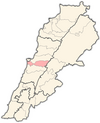Hazmieh
33°51′04″N 35°32′29″E / 33.85111°N 35.54139°E / 33.85111; 35.54139 Hazmieh (also Romanized as Hazmiyé, Hazmie, Hazmiyeh, Hasmiyeh, Al Ḩāzimīyah, and El Hâzmîyé) is a city in Mount Lebanon Governorate of Lebanon, and a suburb of Beirut, part of Greater Beirut.
Geography
Hazmieh covers an area of 2.73 square kilometers directly southeast of Beirut, at an elevation of between 50–200 meters above sea level. Its borders are defined by the Beirut River and Sin El Fil Boulevard to the north, Camille Chamoun Boulevard to the west, by El Sayad Roundabout and Rihaniyya Junction to the south, and a military school to the east.[1]
History
Hazmieh, along with other suburbs to the east of Beirut, has historically been a predominantly Christian area.[2]
For eighty-six years Hazmieh was the location of the Ashfuriyyeh mental hospital. Founded in 1896 by Theophilus Waldmeier, Ashfuriyeh was the first hospital in the Near East dedicated to the treatment of mentally ill patients. Waldmeier was influenced by the thinking of Daniel Tuke and the example of The Retreat hospital in York.[3][4]
In 2002, warlord Elie Hobeika was assassinated along with three bodyguards in an explosion in Hazmieh. Hobeika had commanded troops in the Sabra and Shatila massacre in 1982.[5] Another bombing in 2008 killed a Lebanese intelligence official who had been investigating militant groups in the country.[6]
Name
According to Anis Fraiha in his book Names of Lebanese Cities and Villages, the name Hazmieh comes from two Aramaic words: "haza" which translates as "watch," "monitor," or "observe"; and "mayya," which translates to "water" - he speculates the name refers to a guardian of water.[7] Less credited resources attributed the name to other sources:[8]
- The words Hazmieh may come from the Arabic root "Hazm" (حزم), which means "corral," because it was a meeting point for caravans heading into the mountains.
- It refers to an unknown prince named Hazem (حازم)
- It has Syriac roots from two words: "Haza," meaning deep; and "Mayya," meaning water, since there are springs in the vicinity.
Notable people
Élias Sarkis, former Lebanese president
Sabah, singer and actress
Samira Tewfik, singer
Wadih El Safi, singer and actor
Walid Toufic, singer[9]
References
- Hazmieh at GEOnet Names Server
- ^ "About Hazmieh". Municipality of Hazmieh. Retrieved 2022-12-21.
- ^ "Areas of Beirut". Lebanese Arabic Institute. 22 January 2018. Retrieved 2022-12-21.
- ^ Abi-Rached, Joelle M. (2020) Asfuriyyeh A History of Madness, Modernity, and War in the Middle East. MIT Press. ISBN 978-0-262-04474-5 pp. 4,129,203 n7
- ^ 1908 report
- ^ Schneider, Howard (2002-01-25). "Blast Kills Ex-Commander Tied to Lebanon Massacre". Washington Post. Retrieved 2002-12-21.
- ^ Bakri, Nada (2008-02-05). "Bomb kills Lebanese intelligence officer". New York Times. Retrieved 2002-12-21.
- ^ Fraiha, A. "معجم أسماء قرى ومدن لبنان وتفسير معانيه، دراسة لغوية" (The dictionary of the names of Lebanese cities and Villages and their meaning. Linguistic study. In Arabic). Beirut: Librarie Du Liban. 6th Edition. p.51.
- ^ The official web site for the Municipality of Hazmieh. Archived 2014-12-04 at the Wayback Machine Accessed on 30 Nov 2014
- ^ "Hazmieh History". Municipality of Hazmieh. Retrieved 2022-12-21.
External links
- Hazmiyeh (Baabda)
